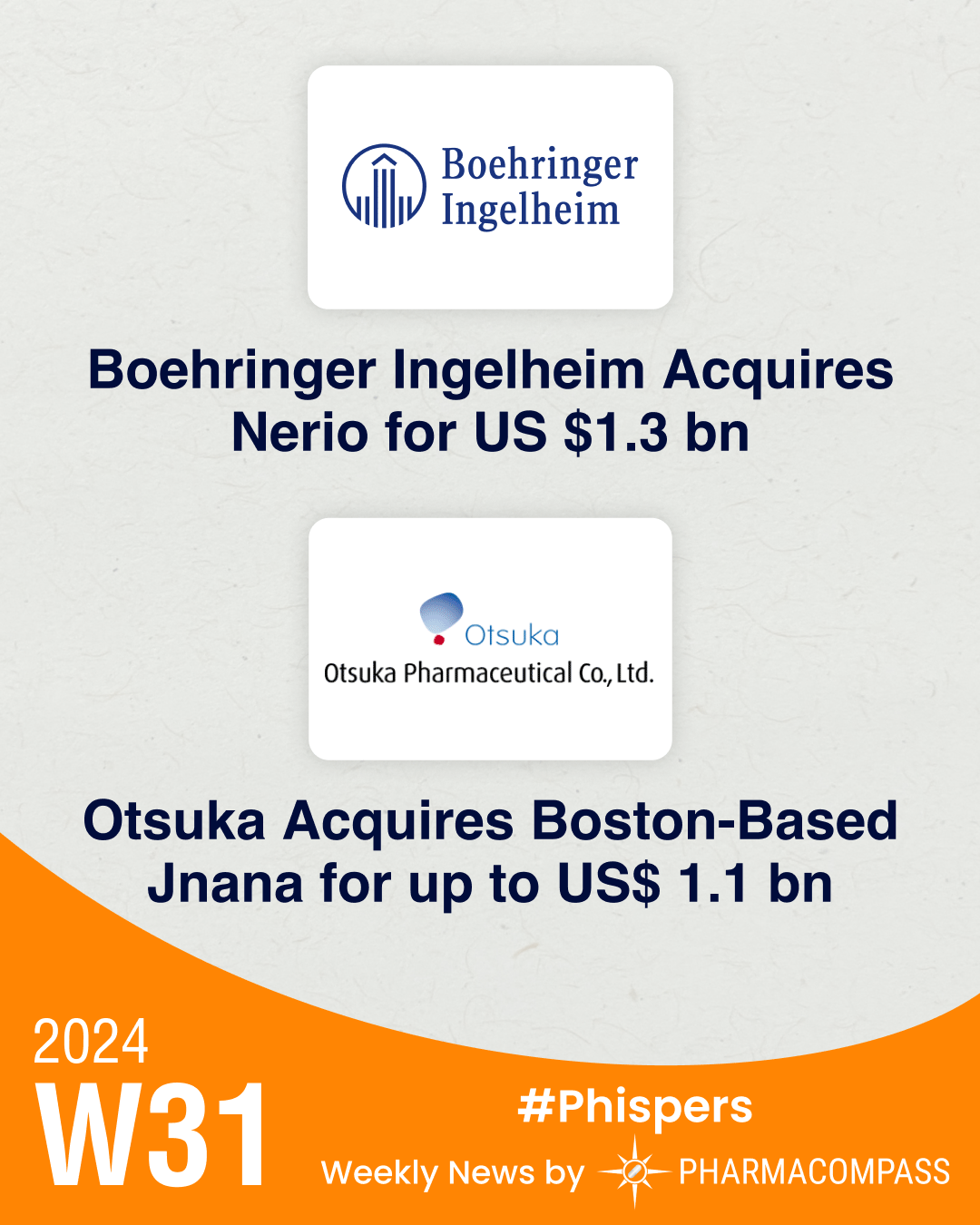
By PharmaCompass
2024-08-01
Impressions: 847 (Article) || 2 (Video)
This week, the world’s largest private pharma company, Boehringer Ingelheim, acquired Nerio Therapeutics for up to US$ 1.3 billion to expand its immuno-oncology portfolio. One of India’s biggest pharma companies, Mankind Pharma, said it is acquiring Bharat Serums and Vaccines for approximately US$ 1.63 billion in a strategic bid to target women’s health. Japan’s Otsuka Pharmaceutical is acquiring clinical-stage biotech Jnana Therapeutics through a potential US$ 1.1 billion deal. With this acquisition, Otsuka hopes to expand its drug pipeline and research base in the Boston area.
French drugmaker Sanofi is investing €1.3 billion (US$ 1.4 billion) at its existing site in Frankfurt, where it manufactures insulin brand Lantus. And GSK has signed a potential US$ 7 billion deal with Flagship Pioneering to identify 10 novel drugs and vaccines.
At the Alzheimer’s Association International Conference (AAIC) held in Philadelphia this week, findings of several studies were presented. Three-year data has shown that the benefits of Eisai and Biogen’s Leqembi increase over time. The news comes days after the European Medicines Agency (EMA) rejected Leqembi. And in another study, Novo Nordisk’s older obesity drug liraglutide slowed loss of brain volume in Alzheimer’s patients.
Pfizer has tacked on US$ 1 billion to its 2024 revenue outlook after seeing a year-over-year (YoY) increase in sales in the second quarter (Q2). Sanofi’s subsidiary Genzyme is suing Sarepta Therapeutics, alleging two patent infringements related to the latter’s Duchenne muscular dystrophy (DMD) treatment Elevidys. And FDA has placed vTv’s lead candidate on hold over an unexplained chromatographic signal.
Boehringer acquires Nerio for US$ 1.3 bn to boost its immune-oncology pipeline
Family-owned Boehringer Ingelheim has acquired Nerio Therapeutics for up to US$ 1.3 billion to expand its immuno-oncology portfolio. California-based Nerio has a preclinical program of novel immune checkpoint inhibitors. Nerio’s small molecules inhibit the protein tyrosine phosphatases N1 and N2 (PTPN1 and PTPN2), which act as immune checkpoints. Through this mechanism, PTPN1/2 inhibition can activate the immune system to fight cancer cells. The inhibitors are believed to “have superior drug-like properties and provide a first-in-class opportunity.”
Mankind buys Bharat Serums for US$ 1.6 bn: One of India’s biggest pharma companies, Mankind Pharma, is acquiring Bharat Serums and Vaccines for approximately INR 136.3 billion (US$ 1.63 billion) in a strategic bid to target women’s health. Mankind manufactures Manforce condoms, PregaNews, GasOFast and other products. The deal would give the company access to Bharat Serums’ portfolio of women’s health and fertility treatments.
Japan’s Otsuka to acquire Jnana for US$ 1.1 bn: Japan’s Otsuka Pharmaceutical is acquiring clinical-stage biotech Jnana Therapeutics through a potential US$ 1.1 billion deal. With this acquisition, Otsuka hopes to expand its drug pipeline and research base in the Boston area. The deal is expected to be completed in the third quarter of this year.
GSK, Flagship sign potential US$ 7 bn deal to discover 10 novel drugs, vaccines
GSK has signed a deal potentially worth over US$ 7 billion with American life sciences venture capital company Flagship Pioneering to identify 10 novel drugs and vaccines that the British drugmaker can develop exclusively. GSK has agreed to pay US$ 720 million in upfront and milestone payments for each candidate. GSK said the partnership will start with respiratory and immunology drugs, indicating that other therapeutic areas may also be added. Flagship owns over 40 biopharma companies with drug development capabilities.
Sanofi to invest US$ 1.4 bn in new insulin facility: Sanofi has said it will invest €1.3 billion (US$ 1.4 billion) in a new insulin production facility at its existing site in Frankfurt. The French drugmaker manufactures its popular insulin brand Lantus at this site. Sanofi will construct a 36,000-square-meter facility that will replace Sanofi’s current insulin production plant in Frankfurt’s Hoechst district by 2029, the company said.
Pfizer adds US$ 1 bn to 2024 outlook as second quarter sees YoY gain
After five quarters of witnessing year-over-year (YoY) losses, Pfizer has finally posted a quarter with YoY gains. The New York-based drugmaker saw revenue of US$ 13.3 billion in Q2 of 2024, compared to US$ 13 billion posted in Q2 of 2023. It has subsequently revised its 2024 guidance, raising it by US$ 1 billion with revenue for the year which is now expected to come in between US$ 59.5 billion and US$ 62.5 billion.
Benefit of Eisai, Biogen’s Leqembi increases over time, says study
A study on Biogen and Eisai’s Leqembi (lecanemab) showed that after 18 months, the Alzheimer’s drug reduced cognitive decline by 27 percent. And after three years, it slowed cognitive decline by 31 percent. More importantly, there were no new findings related to safety over the three years. That is to say, the brain swelling and bleeding linked to the drug, which works by removing amyloid plaque from the brain, for the large part occurred in the first six months.
The results were presented at the AAIC, days after the EMA rejected Leqembi saying the drug’s meager benefit on slowing cognitive decline in early Alzheimer’s did not outweigh its risks.
Novo’s older obesity drug shows benefit in Alzheimer’s: Novo Nordisk’s older generation glucagon-like peptide 1 (GLP-1) drug liraglutide reduced shrinking in the parts of the brain responsible for memory, language, decision-making and learning by 50 percent over a placebo, a study found.
FDA okays Alpha Cognition’s Alzheimer’s prodrug: FDA has approved Alpha Cognition’s Zunveyl (benzgalantamine) to treat mild-to-moderate Alzheimer’s disease. Zunveyl is taken orally twice a day, and is a prodrug, or a biologically inactive compound that can be metabolized by the body to produce a drug. As a prodrug of Alzheimer’s medication galantamine, benzgalantamine remains inactive as it passes through the stomach. Alpha said Zunveyl is designed to address the tolerability issues with the popular Alzheimer’s med galantamine.
Sanofi’s Genzyme sues Sarepta, alleging two patent infringements
Sanofi subsidiary Genzyme has sued Sarepta Therapeutics alleging two patent infringements relating to the latter’s Duchenne muscular dystrophy (DMD) treatment Elevidys. According to Genzyme, Sarepta has replicated its technology for modifying viruses that deliver genes into human cells in gene therapies like Elevidys.
FDA places all trials of vTv’s lead candidate on hold: FDA has placed on hold all trials of vTv Therapeutics’ lead candidate cadisegliatin. That includes a phase 3 trial in type 1 diabetes. “The clinical hold was based on the discovery of a chromatographic signal in a recent human absorption, distribution, metabolism, and excretion (ADME) study of cadisegliatin that could not be resolved by standard mass spectroscopy,” the company said. FDA seeks an in vitro study to characterize the signal.
The PharmaCompass Newsletter – Sign Up, Stay Ahead
Feedback, help us to improve. Click here
Image Credit : Phisper Infographic by PharmaCompass license under CC BY 2.0
“ The article is based on the information available in public and which the author believes to be true. The author is not disseminating any information, which the author believes or knows, is confidential or in conflict with the privacy of any person. The views expressed or information supplied through this article is mere opinion and observation of the author. The author does not intend to defame, insult or, cause loss or damage to anyone, in any manner, through this article.”







